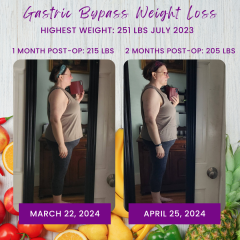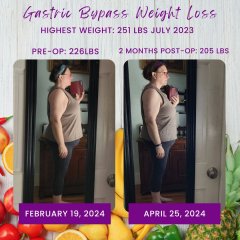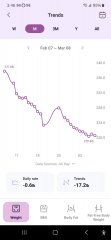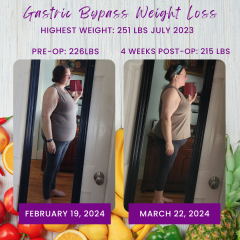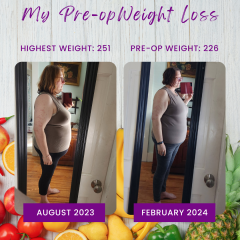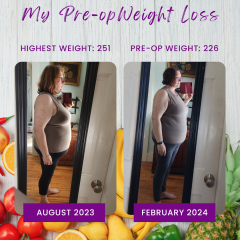-
Content Count
552 -
Joined
-
Last visited
-
Days Won
29
Content Type
Profiles
Forums
Gallery
Blogs
Store
WLS Magazine
Podcasts
Everything posted by ChunkCat
-

Modified Duodenal Switch
ChunkCat replied to Lara in Arkansas's topic in Duodenal Switch Surgery Forum
I have yet to see a nutritionist or dietician that truly understands the optimal diet for a SADI or DS patient. Most of the time we just get a modified version of what they give Bypass and Sleeve patients. But as you say, you aren't absorbing as much as they are, therefore to give you their requirements would leave you malnourished. 15 grams of fat is absurd by all medical standards. Most medical studies show we need 60 grams of fat for proper hormone function and even if you ate 60 grams of fat, with an altered digestive tract, you aren't absorbing that much, so you need to eat a little more than that. Even the ASMBS recommends 60 grams of fat by 1 year out!! Your dietician is not following best practices. Most SADI/DS patients I know follow the vets that have been living with this surgery for 10+ years and maintaining their weight loss. We figure they know more about optimal diet than a surgeon who has never lived with this surgery, or a dietician that has never even researched best diet for bariatric patients of various surgeries. Most patients I know are eating 100-120 grams of protein, less than 50 grams of carbs, and over 60 grams of fat, usually around 100 grams of fat for SADI and 150 grams for DS. You can increase your carbs once you have reached your goal weight, they tend to slow/stop weight loss, so in active weight loss it is important to keep them low so you stay in ketosis. A calorie range makes dieticians feel better, but it makes no sense for a SADI or DS patient because we malabsorb so much fat we can't even begin to properly calculate our calories. You could eat 1200 calories, but that wouldn't be what your body is absorbing. I'm sorry this is so complicated. In the end you have to decide what you feel best at. I don't feel good following guidelines like your dietician gave you and when I go over 50 grams of carbs I stop losing weight. So...yeah. I'm going to follow what allows my brain and hormones to function, what makes my skin, hair, and eyes feel best, what gives me the most energy, and what allows me to lose weight steadily. I'm the one that has to live in this body. It is sad these surgeries are so uncommon there are no good studies about optimal nutrition for them. But there is no way I'd go below ASMBS guidelines, they are the closest thing bariatric surgeons have to a standardizing body. Your dietician should be able to give you ASMBS guidelines for your surgery. -
You being able to drink more fluids is not due to your tummy being bigger. You probably are not having as much internal swelling as someone else does. Also, some never lose their ability to gulp a good bit of water, and you don't list your surgery, some bypass patients also have this happen. Fluids exit our stomach really quickly, some faster than others. The restriction with fluids early on is because of the internal swelling and how long it takes to get to the stomach through that swollen area. I had a LOT of swelling. Water went down at a trickle. I could literally hear it displace air in my stomach when it finally got there, like a little drain finally clearing. It was hilarious and so strange feeling. For me it took 3 weeks for this weirdness to stop. I can take a good 3-4 full swallows most days now before I get pressure from my tummy to slow down. I tell you all this because I know for a fact I have a larger sleeved stomach than most, my surgeon made it that way due to reflux. I've seen it empty fluids on imaging, it is fast as lightning! LOL Your tummy will not lead to bad food choices, even if it were bigger. But your mind will! Trust me, once you add solid proteins in, you will probably feel your restriction to some degree. Many never feel restriction with purees and fluids.
-

Does your pre-op diet weight loss "count"?
ChunkCat replied to NickelChip's topic in General Weight Loss Surgery Discussions
I find the calculator on the Mexico site to be rather inaccurate for me, but everyone varies. Age and surgery type, as well as co-morbidities all impact weight loss rate. It thinks I should be at 212lbs at 6 months but I'm at 240 with 6 days to go. Not gonna happen. It also thinks I should be at 170 by 12 months, but that's not very likely either. I've always used the following one as it takes into account the different surgeries and looks just like the one my surgeon uses. They calculate from the highest weight, it is important to include that because if you have a lot of weight loss before surgery your percentages may track differently and your post op weight loss may be slower. I've seen this happen to several people with surgeons calculating it improperly, or applying the bypass trajectory to a DS patient, which is a disaster and very stressful for the patient! This one takes into account much more like your age, ethnicity, and pre-existing conditions: https://riskcalculator.facs.org/bariatric/?_ga=2.112690692.1282950073.1698781773-393992475.1698781773 According to this one I should be at 78 lbs down for my DS surgery at 6 months. I'm at 80 lbs down. My weight loss has tracked along with this thing pretty steadily, give or take 15 lbs, since surgery, except for my 6 week stall. It puts me at 202 by 12 months out, but DS patients lose for 18-24 months post op, so I should be at 170 sometime in that 12-24 month period! In the end these are all just estimation tools. Our bodies do what they will and we make the most of it. Still, it is nice to have a loose guideline to follow. -

How Can I tell I’m Hungry?
ChunkCat replied to SpringCleansing's topic in POST-Operation Weight Loss Surgery Q&A
For the first month, hydration is king. Calories are nice. Protein is good. But dehydration is the number one reason for ending up in the hospital post-op. Your family should be told about that. Aim for at least 64 oz a day. You may not get that at first, but after a few weeks of trying you will. For the first two weeks I felt like I was constantly drinking---and I was! I couldn't tolerate protein shakes or anything like jello or pudding, I had stomach spasms pretty severe the first two weeks. I could only get down water (which I had to flavor with sugar free flavorings to get down) and sugar free popsicles. My surgeon said that was okay. We have protein stores in our bodies to get us through the first few weeks. But it is still good to aim to get protein in as much as your tummy will allow. And I took my meds one pill at a time, spaced out throughout the day. Your family clearly loves you and are concerned, but only YOU know how you feel. It's okay to remind them of that. If they need more info they can read your packet from the surgeon or come read posts here. 😂 You'll get through this. Just keep sipping!! 💚 -

Best Gastric Bypass Revision Dr in North Texas
ChunkCat replied to KarenLR75's topic in Weight Loss Surgeons & Hospitals
Hey Karen. There are two doctors in that area that are highly recommended in my DS group. Doctors who are skilled enough to do a DS usually also do various complex revisional surgeries. I wouldn't consider yours a revision so much as a repair, as you aren't looking to change surgeries for significant further weight loss. I wouldn't hesitate to see either of these men for an opinion. You are very lucky to live where you do, it is hard to find surgeons with this much skill! https://www.ultimatebariatrics.com/jayroberts Dr. Roberts does revisions and his patients seem to love him! https://weightlosssurgeon.com/drway/ Dr. Ayoola is by all accounts an incredible surgeon and his patients seem to love him too. -
Yeah, if it was labwork I'd never let them try that many times. But it was for iron infusions I desperately needed so I could avoid blood transfusions, so it was more life-and-death than a lab draw. LOL The IV team often has the anesthetics that they can use, I like the numbing spray! It wears off fast but it does help a little.
-

How Can I tell I’m Hungry?
ChunkCat replied to SpringCleansing's topic in POST-Operation Weight Loss Surgery Q&A
One of the biggest adjustments I had to make post op was to eat because I needed to, not because I was hungry. I actually never lost my hunger post op, but in those first few weeks when all you can consume is liquid, it is a struggle to get everything in. As soon as I moved to purees I started eating something every 3 hours when I was awake. Everyone's interval is different. Some can do just 3 times a day, but for me if I got over the 3 hour mark I'd start to get shaky and irritable and completely crash, it was clear I needed food, even if food was just a shake or a protein yogurt. I'm 6 months post op now and this has eased and I can go a little longer, so I follow my hunger cues more now and mostly eat at normal mealtimes with snacks if I'm up late or up early. But in the early months I just couldn't do that. -
I have awful veins, they are tiny, like to hide and roll and refuse to comply. There is no difference in the hunting game based on weight, I was told it is hereditary and that makes sense, far as I know all the women in my family have tiny veins. Hydrating helps but if it is hereditary nothing will change it, it is how your body formed in the womb. I usually look bruised and battered after they get done with me. I had surgery last week and both my hands are black and blue because they insisted on trying my hands first and my hands NEVER work. I'm going to start forbidding them to do it, it takes a month for them to heal and it hurts like hell. We forget that as patients it is okay to tell someone they can't do something to you. Anesthesiologists are the best at finding a good vein, but most good hospitals have IV teams that can come and do it with their sonograms too. I don't let anyone try on me more than twice. Two tries and they have to go find someone else to have a go because by then they've lost confidence and their odds of finding something are nil. My record is 8, thankfully the IV team finally arrived to end my torture. 😂
-
Welcome!! I had a friend who had bypass about the same time as you did and it was very different back then!! We have so many more resources available now. And SO many more products!! I remember how much she hated adding protein powders to her food and how stubborn she was about ignoring healthy food. She lost a ton of weight but I often wonder if she regained since she ate such junk post op. Eventually the portions catch up with you! Most advice for losing weight a while after surgery is to go back to basics, watching your portion size, cutting out simple carbs, getting most of your calories from healthy complex carbs, a little fat, and a generous portion of lean protein. Eat your protein portion first, your veggies second, and a few bites of a healthy starch/carb last, if you still have room. Get in whatever good movement you can. Drink at least 64 oz of water and for bypass patients I believe your protein per day should be close to 80 grams. You'd have to ask your doctor about your calories though. Do you still feel your restriction? I know with bypass they can do testing to see what your pouch looks like and hernia surgery is a good time to revise it if it needs a revision. I just had a hernia repair. I'm about 6 months post op from a Duodenal Switch. The healing process after hernia repair has been a lot like bariatric surgery. I can only eat liquids and some purees at the moment and I'm a week out. But I'm so glad I had the repair done!
-
This is totally normal---but freaks you out just the same because what if it stops, right!?! The first 3 months are normally fastest. But the closer you are to your goal weight, the slower it gets. Each surgery has a bit different loss rate, but if you stay the course, even as you slow down, you will get to goal. If you have hit 50% of your excess weight by 6 months you are doing really well according to most surgeons. I definitely didn't lose 50% in the first 3 months, most people I see lose 50% by month 5 or 6. But it also depends on how much you have to lose and your individual body's pace. Some lose it really rapidly and are at goal by month 7 or 8. Some take 18 months to hit the same goal. My body is a slow poke and likes to have 6 week stalls! So I hit my 50% mark at close to 5 months but have been stalled for a month since and actually regained 6 lbs, lost it, and then just gained 15 lbs in fluid from surgery again. My weight tracking app looks like an absolute mess. LOL Working out can seem to cause stalls and slowing down too, because you are trading fat for muscle and muscle weighs more. Plus the act of working out changes the fluid balance and such in your body, so sometimes you appear to gain some weight when you start working out in earnest, but it'll balance out over time.
-

Gastric Bypass 5 yrs out - side pain for 2 yrs, surprising "cause"
ChunkCat replied to KarenLR75's topic in Gastric Bypass Surgery Forums
This sounds miserable. I haven't had bypass so I can't comment on that, but I did just have a hiatal hernia repair due to food getting caught in my esophagus and causing choking and chest pain. Best they can tell it was probably a sliding hernia, so sometimes most food could pass but pills would get stuck, and other days nothing could pass but water at a trickle. It was a really scary feeling and I'm thankful they got me in so quickly! You say you have this pain, but are you having any of the other symptoms of dumping like diarrhea, heart palpitations, dizziness, nausea, etc...? I would consult the revision specialist to see if they have run into something like this before. Right sided pain is so non-specific. I have a ovary that hides and when I ovulate on that side it hurt like HELL. I think it was pinned by my bladder and uterus, because after my hysterectomy the pain is much better (they left my ovaries). But that would only be for a few days every few months. Not as frequent as your pain sounds. I hope you find some answers. I'm sorry you are in such pain! -
You can do this Carrielee!! I started out with many of the things on your list. Now most of them are gone. I'm almost 6 months post op a Duodenal Switch. I've lost half my weight, from 320 to 240!! I feel incredible. It is so, so, SO worth it!
-
Thank you everyone for your well wishes! I totally forgot I wrote an update here... I'm one week post op today. I gained 15 lbs in water weight overnight because they had to give me tons of fluids to bring my BP up after surgery! I stayed one night in the hospital. Everything has been fine except I seem to have picked up a bug while I was there and I've been running a low grade fever, coughing, and a sore throat. So I've been hydrating well and sleeping a ton. So far the Covid tests are negative.
I haven't been able to advance my diet past purees. Everything I eat other than tofu makes me choke and feels like trying to swallow rocks. They warned me it would get worse before it gets better, so lets hope this is all normal. I have my follow up on Monday so we'll see. Living on shakes and soup again is not fun. I had enough of them the first time!! LOL
-
Well, tomorrow I go in for an impromptu hiatal hernia repair after ending up in the ER over the weekend because I couldn't get food down and water was moving at a trickle... I've been having these symptoms on and off for a few weeks but Sunday was the worst by far and came with chest pain and trouble breathing. The ER PA thinks it is just esophagitis and that the surgeon and radiologist are wrong. But the bariatric surgeon swears it is a hernia, possibly a sliding one based on my symptoms. So he fit me into his schedule this week to repair it! I hope he's right and this sorts it out. He's going to do a scope afterwards to be sure there is nothing wrong with the esophagus. Here's hoping it all goes well!!
- Show previous comments 1 more
-

-

I hope it goes well! Sending positive thoughts for a speedy recovery!
-

-

I've lost half of the weight towards my goal!!
ChunkCat posted a topic in POST-Operation Weight Loss Surgery Q&A
I can't believe it. I got on the scale this morning and it was 244.5 lbs. I've officially lost half of the weight towards my goal! I'm down 76 lbs since my highest weight and 63 lbs since surgery. And I'm not even 5 months out! I really didn't think it would happen this quickly. And weirdly enough, I feel smaller now than when I was this weight before. Weight distribution is a funny thing. Here's a pic of me pre-op at about 312 lbs, and two pics of me from today! I have so much more energy and mobility now. I'm so grateful to myself for having this surgery despite my fears and concerns. It has been SO worth it! Big thank yous to all of you guys for supporting me as I go through this, I really value this forum and everyone who posts here! ❤️ -
We eat out a lot since my partner works a very time intense job, we have no kids, and I'm still recovering from some serious health issues that cause a ton of fatigue. I generally aim for the same things at a restaurant that I would cook at home--healthy proteins, lighter sauces/marinades, sides that are low carb veggies instead of starches, and I always tell the waiters no chips/no bread, because if it isn't even brought to the table, we can't eat it! Hahaha! I've found that a lot of places will work with you to modify what you are ordering if you let them know you have special dietary needs. At my favorite breakfast place they make me a modified kids plate (one egg, one sausage, and fresh fruit) when I don't feel like having leftovers from a full size omelet. At my favorite pho place they replace the noodles with veggies. At Mexican places I tend to order fajitas with no tortillas, beans, or rice (my stomach does not play nice with beans or I would eat those!), or if I don't want leftovers, a side salad and steal some of my partner's protein. Steakhouses are VERY easy as long as you tell them to keep the bread. Two veggie sides and a lean steak usually means several meals at home later! Our local taco place will make you any taco in a lettuce leaf, or in a bowl instead of a tortilla. Thai places almost always will hold the rice and give me extra veggies if I ask when I order a curry. Sashimi is an easy alternative to sushi that avoids rice and I just ask for a side of avocado so I can still have the tuna and avocado combination I love so much! Smoked chicken or pork from the bbq places is great for several meals and they always have green beans or collard greens. And there's a Peruvian chicken place close by whose chicken I like much better than the supermarket and they make salads with fresh vinaigrettes instead of cream dressings. If we are traveling we tend to eat at some sort of chain restaurant that has their nutritional info online so I can hit my macros without worrying too much. The best advice I can give for eating out is to try and get ahold of the menu ahead of time so you can find a few options without feeling rushed in the moment when the waitress wants your order. And ask for a to-go container when they bring your food so you can put away all but the portion you would usually eat. Dieters tend to do this anyway, but our dietician suggested it to a woman who goes out to eat daily for business meetings so she wouldn't feel self-conscious about having so much food left on her plate in front of clients. When you put away your food before you start eating, people tend to forget you did and you can still stash away any last bits if you don't want to leave them behind after you eat. ❤️
-

Sleeve Veteran researching revision to SADI
ChunkCat replied to ShoppGirl's topic in WLS Veteran's Forum
I'm so glad you tried the muffins and liked them!! I really enjoyed mine, they kept well in the fridge and warmed up really well with a quick zap in the microwave. Regarding the nutritional needs of a SADI patient. We don't really know, honestly. The SADI is too new to have some of the longer term studies that have been done on the sleeve, bypass, and DS. But it is commonly thought by most surgeons that the dietary needs of a SADI are more than with the bypass because SADI patients are thought to malabsorb more than a bypass patient. And their needs are most likely a little less than a traditional DS. That said, I attended nutrition classes with all the different surgeries in one group, so we had to learn everybody's requirements!! Most good surgeons recommend that SADI patients follow the dietary requirements of a DS patient to be on the safe side. That means 80-120 grams of protein, less than 50 TOTAL carbs while in the active weight loss phase (the dietician said "net carbs" is not an official measurement, but if you want to follow net carbs you'd need to keep under 30 net carbs since they get counted differently, most DS patients introduce a bit more complex carbs into their diets once they reach maintenance weight) and the fat grams recommended by the ASMBS is 60 grams of fat by 1 year post op. However, SADI and DS patients malabsorb a good amount of fat, so veterans of the surgeries will tell you that you need more fat than that. I seem to feel best around 80-100 grams of fat a day, but there are veterans of the DS surgeries that eat closer to 150 grams, or whatever alleviates their constipation and eases their symptoms of low fat like dry eyes and dry skin. According to most studies, a DS patient only absorbs about 20-30% of the fat they consume, around 60% of the protein they consume, 60-80% of the complex carbs, and every single calorie of simple carbs!! That's why simple carbs are so important to restrict post surgery (besides the digestive drama), you can eat your way around any surgery with simple carbs... And this is why counting calories is pretty useless for DS and SADI patients. We don't yet know exactly what the percentage of absorptions is for SADI patients as they haven't done a breakdown study (as far as I know) but it is safe to assume SADI patients absorb a little more fat and protein than a traditional DS patient would. The best way to find your own perfect macros post surgery IMO is to aim for 80-120 grams of protein and then watch your protein labs. They will tell you if you need more protein or if you can back off a little. And for me at least, I find my skin, hair and eyes are highly sensitive to when I have too little fat in my diet. -

Sleeve Veteran researching revision to SADI
ChunkCat replied to ShoppGirl's topic in WLS Veteran's Forum
Yay for progress!! -

Unable to exercise due to dizziness and fatigue after surgery and Covid
ChunkCat replied to SomeBigGuy's topic in Fitness & Exercise
I'm so sorry you are struggling with this still and that you aren't able to get in with a specialist. Post viral issues are both literally and figuratively exhausting. What you experienced with the walking 4 miles and not getting out of bed for 3 days afterwards is caused "post exertional malaise" and it is common in long covid as well as things like Chronic Fatigue Syndrome. I experience it a lot. That device I linked to earlier is supposed to help you gauge where your body's threshold is regarding this and keep you right under it so that you can still be physically active without triggering that backlash. It is a really frustrating thing to experience, especially when a few months ago you could have walked that distance without issue. I experience this still every time I try to push beyond 5,000 steps a day. This is a vast improvement over what triggered it pre-op, but it is still nowhere near where I want to be. I'm going to add in some strength training components to see if strengthening the muscle function in my body will help me be able to push the threshold up a bit, but if not I'm going to find a physiologist who can help me figure it out because I hate the physical limitations that come with these viral conditions and general deconditioning. -

Random question- who was the 1st to notice?
ChunkCat replied to Clueless_girl's topic in Duodenal Switch Surgery Forum
Hahahaha!! I have been getting mad about this too! And the vast inconsistency of sizes when you are trying to buy clothes that fit online!! Why haven't these things been standardized, it is truly absurd. Fabric differences are one thing, but a 6 inch difference in bust in the same size and same fabric is wicked annoying... -

My Progress
ChunkCat commented on NickelChip's gallery album in Before and After Gastric Bypass Photos
-
Yeah, not buying it. The medical community looks for what it wants to see. I married a statistician. They constantly remind me "Correlation does not equal causation!!" The medical community wants to believe that more physical activity will miraculously solve obesity issues because it puts the cause and the remedy right back in our laps, instead of admitting that this is a disease that is very complex and no one smoking gun is the cause or the cure. We need holistic approaches. I was a very active child. So were my siblings. My brother is a normal weight, my sister is often underweight, and I ended up over 300 lbs. My parents are normal weight though they both have siblings with weight issues. I gained a ton of weight while I was still active. Puberty hit and it was like someone switched on a helium tank and I just ballooned up. I've had more doctors than I care to count tell me that if I just got more physical activity and stopped eating McDonalds all would be well, ignoring the fact that I hate McDonalds and until my autoimmune disease got severe I was quite physically active. I know a lot of thin people who are couch potatoes. I know a lot of fat people who are active. These "studies" do nothing but continue to give doctors more ammunition in the shame game that is current obesity management. My partner is Chinese, was raised on traditional Cantonese food (which is very healthy in general), in a family where everyone is effortlessly thin except their grandmother who was diabetic... Several years ago my partner was diagnosed with diabetes. They've had weight issues all their life, despite being very active for most of it. Is it genetics? Perhaps. Is it current lifestyle? It probably contributed to it. Was it due to a childhood diet based on rice? Not likely, that diet also incorporated a ton of healthy protein options and a healthy variety of vegetables, including plenty of greens. A lack of exercise was certainly not the cause of it and increasing exercise is not going to be the cure for it either...
-
I dose out my vitamins for a whole month at a time using these pill cases: https://www.amazon.com/gp/product/B08QR78YP3 Sometimes you can find them (or a similar brand) with a coupon for a bit more off, but honestly they are cheap enough to get 4 and still not break the bank. Start with 1 or 2 though until you know you like them. I love how colorful they are, it helps me not lose them when I carry around the day's doses. Then I set a medication reminder (iphones have this in the health section, but you can get apps for it too). I have to take vitamins and meds 4 times a day, so doing this really helps me remember to take them and to not get behind. Finding movement you enjoy is important. Gyms aren't necessary and for many of us they hold a lot of negative associations. If you love the gym then disregard this suggestion, but if you don't, you might be much more likely to do an exercise that actually feels GOOD in your body to do. Also, I carry protein snacks with me at all times. And when I get off track and forget, I stop at a store or gas station to get little packets of nuts and jerky, instead of stopping at a fast food place or eating a bunch of simple carbs. I keep reminding myself that just because I'm cleared for "all foods" does not mean that "all foods" are "right now" foods. Some things are not for us in this first 18 months, even if we can technically digest them fine. When I relax into that awareness and get myself back into ketosis, I usually feel better and stop craving simple carbs so much. Except for chocolate. I will always want chocolate. LOL
-

How can I possibly live like this?
ChunkCat replied to lolyschmoney's topic in Gastric Bypass Surgery Forums
In people with an intestinal component to their surgery (like gastric bypass, SADI, and DS) sometimes GI symptoms can happen like chronic gas. You might consider exploring a FODMAP diet to see if you can find the foods that are triggering the gas. Odds are something you are eating is causing this... You could also try adding a probiotic, sometimes the gut microbiome can get off kilter. And a reduction in the simple carbs you are eating might help too if you eat a lot of carbs as opposed to a protein heavy diet. As for the burping, it sounds like for some reason you are swallowing a lot of air. You might try drinking fluids a bit differently. If you drink from a bottle or a straw a lot, you might switch to a wide mouthed cup. My dietician said a lot of water bottles and narrow shaped cups (as well as straws) can cause you to swallow a lot more air than normal, causing burping and sometimes nausea. I'm sorry food doesn't feel good right now. I feel the movement of food in my esophagus and stomach a lot, as well as when I drink. Small sips and small bites help. Small is smaller than you think. I hear it gets better as time goes on... Sometimes I can eat relatively normally, other times (like this week) my restriction is super high and I can only eat half of what I normally do, or less. There is an ebb and flow to this. So on my high restriction days I eat less and drink more protein supplements. On my low restriction days I get more veggies in and a hefty dose of meat based proteins. I figure it all averages out in the end! I agree though, a talk with your doctor is in order. You shouldn't be experiencing pain at this point. On rare occasions bypass patients can develop strictures which could cause some of the symptoms you list. -
Gastric bypass for GERD developed from a sleeve surgery is considered the gold standard of treatment. However, it is not 100% effective... A number of studies, like this one https://www.nature.com/articles/s41366-022-01072-9 show that up to 30% of people still report post-operative GERD symptoms to some degree after gastric bypass. You are not experiencing the impossible, nor are you imagining it. Unfortunately these occurrences have not been well studied, so it is good you are having an endoscopy to check things out. Hopefully it will show something that can be easily corrected!! In the meantime, elevating the head of your bed when you sleep can make a big difference. You can do this by elevating the actual mattress, or sleeping with a wedge pillow. As an aside, when you developed GERD with the sleeve, did they do studies to prove GERD due to stomach acid reflux? I ask because some people with GERD actually have bile reflux, which can produce the same symptoms but has a very different treatment path. It is worth ensuring they've tested for bile reflux just to be sure they are treating the right condition.






